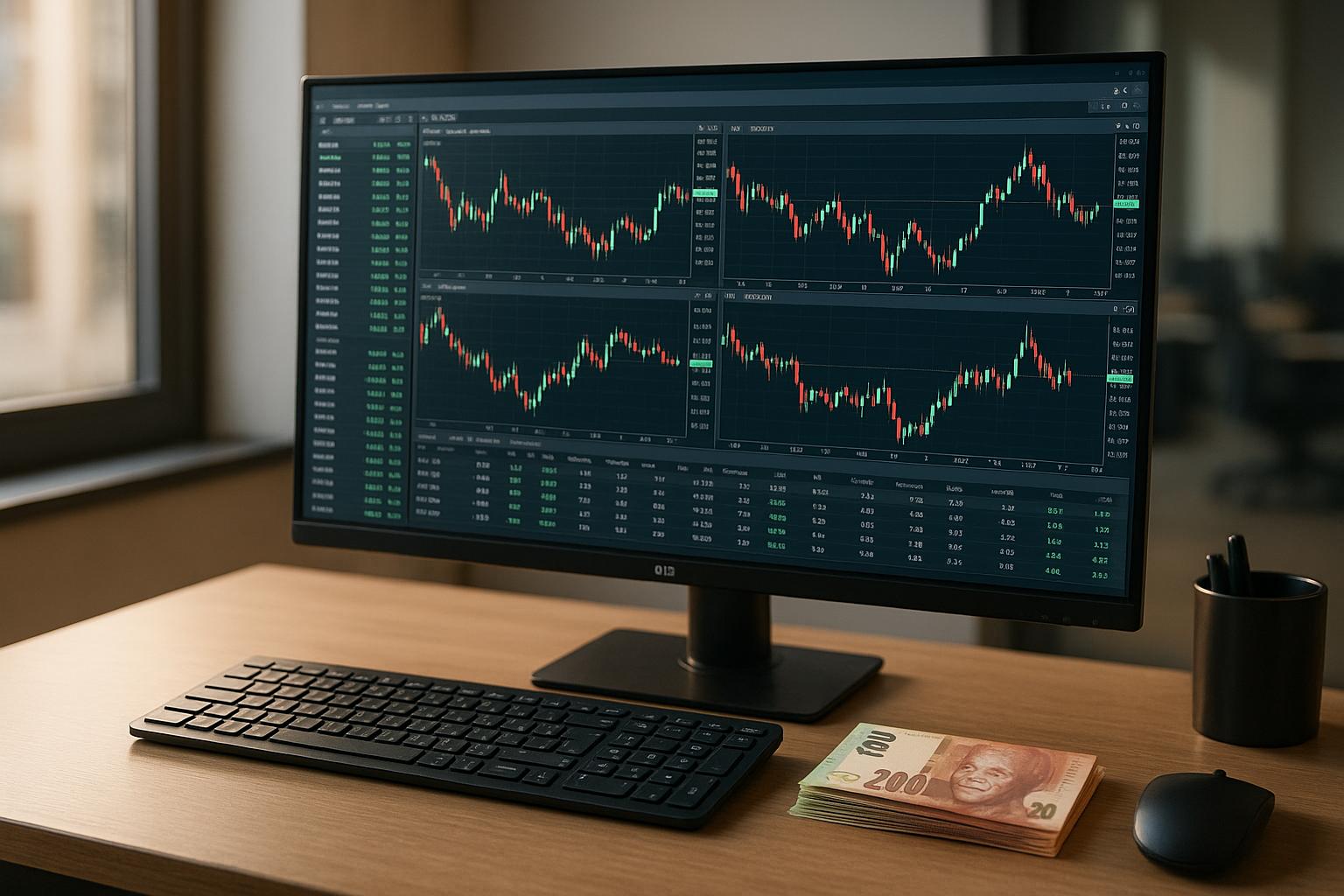Forex trading fees directly affect your profits. Understanding these costs can help you make better trading decisions. Here’s a quick breakdown of key points:
- Main Fees: Spreads, commissions, and overnight charges (swap rates).
- Account Types:
- Standard Accounts: Wider spreads, no commissions (e.g., EUR/USD spread from 1 pip).
- ECN Accounts: Tighter spreads (from 0.6 pips) but with commissions (0.20% per trade).
- Regulations: FSCA sets a leverage cap of 30:1 and ensures fair trading conditions.
- Extra Costs: Currency conversion fees (0.5%), inactivity fees, and platform charges.
Quick Comparison
| Fee Type | Standard Account | ECN Account |
|---|---|---|
| EUR/USD Spread | From 1.0 pip | From 0.6 pip |
| Commission | None | 0.20% per trade (min R50) |
| Overnight Fees | Applied | Applied |
| Currency Conversion | 0.5% | 0.5% |
Tips to Save on Costs:
- Choose FSCA-regulated brokers with transparent fees.
- Trade during high liquidity hours to reduce spreads.
- Avoid holding positions overnight to skip swap fees.
Understanding these basics can help you reduce trading costs and improve profitability.
Best Brokers in South Africa || Choose Wisely – AtoZ Markets

Main Forex Trading Fee Categories
Forex trading costs come from three main areas: spreads, commissions, and overnight charges. Each of these adds to your overall expenses and can impact your profits.
Understanding Spreads
A spread is the gap between the bid price (what buyers offer) and the ask price (what sellers want). This difference represents your transaction cost. For example, if EUR/USD is quoted at 1.1000/1.1002, the spread is 0.0002 units.
| Spread Type | Description | Best For |
|---|---|---|
| Fixed | Stays constant, regardless of market conditions | Traders who prefer stable costs |
| Variable | Changes based on market volatility | Traders comfortable with fluctuating costs |
| Raw ECN | Minimal spreads with an added commission | High-volume traders aiming for lower overall fees |
When market liquidity is high, spreads typically narrow because of increased trading activity.
Trading Commissions
In addition to spreads, commissions are another cost to consider. For instance, ECN accounts often charge a commission on both the opening and closing of a trade, calculated per lot.
Overnight Fees and Swap Rates
Holding a position past 22:00 GMT incurs overnight fees, also known as swap or rollover rates. These fees arise from differences in interest rates between the currencies in your trade. The formula to calculate swaps is:
Swap = (Pip Value × Swap Rate × Nights) / 10
For example, if you’re trading EUR/ZAR and the interest rate difference is 4%, you might face a negative swap. Note that on Wednesdays, swap fees are tripled to account for the weekend.
South African Broker Fee Analysis
FSCA-regulated brokers in South Africa have varying fee structures depending on the type of account and services offered. Here’s a breakdown of the most common fee setups.
Standard Account Costs
Standard accounts typically feature wider spreads, around 1 pip for EUR/USD pairs, and do not charge commission fees.
| Currency Pair | Typical Spread Range | Commission |
|---|---|---|
| EUR/USD | 1.0 – 1.5 pips | None |
| USD/ZAR | 136.67 – 150 pips | None |
| GBP/USD | 1.2 – 2.0 pips | None |
These accounts are ideal for traders who prefer straightforward pricing, as spreads include all costs. However, during volatile market conditions, the wider spreads may lead to higher trading expenses.
ECN Account Costs
ECN accounts differ by offering tighter spreads but include a fixed commission:
- Spreads starting from 0.6 pips on major currency pairs
- A commission rate of about 0.20% per trade
- A minimum commission of ZAR50 for online trades
These accounts are well-suited for high-volume traders. For instance, if USD/ZAR is quoted at R18.50/R18.55, the raw spread is R0.05 before adding the commission. The tighter spreads can help offset commission fees for frequent trades.
Fee Comparison Data
The table below highlights the key differences between standard and ECN accounts:
| Fee Component | Standard Account | ECN Account |
|---|---|---|
| EUR/USD Spread | From 1.0 pip | From 0.6 pip |
| Commission | None | 0.20% per trade |
| Minimum Trade Size | 0.01 lot | 0.01 lot |
| Overnight Fees | Applied at 23:59 server time | Applied at 23:59 server time |
Choosing the right account type depends on your trading strategy and how you plan to manage costs effectively.
sbb-itb-127c594
Reducing Trading Costs
Cutting down trading costs directly impacts your bottom line. By understanding the types of fees involved, you can apply targeted strategies to manage expenses effectively. Building on our earlier fee breakdown, here are practical ways to reduce trading costs.
Choosing the Right Broker
Selecting the right broker is the cornerstone of cost-efficient trading. Here’s what to prioritise:
Regulatory Compliance
- Confirm the broker is licensed by the Financial Sector Conduct Authority (FSCA).
- Check for features like negative balance protection to safeguard your account.
- Opt for brokers offering accounts denominated in ZAR.
Transparent Cost Structures
Look for brokers with clear and competitive pricing. For example:
- Raw spread accounts starting from 0.0 pips with commissions from R100 per round turn.
- Standard accounts with spreads from 0.8 pips on EUR/USD and no commission.
- Fixed spread options to manage costs during volatile periods.
Managing Trade Size and Timing
Your trade size and the timing of your trades can significantly impact costs:
Position Sizing
- Adjust position sizes to account for spread costs.
- Combine smaller trades to meet volume discount thresholds.
- Scale positions effectively to minimise the impact of spreads.
Market Hours
Timing your trades can improve liquidity and reduce costs:
- The European session (09:00 – 17:00 SAST) offers strong liquidity for EUR pairs.
- The US session overlap (14:00 – 17:00 SAST) is ideal for USD pairs.
- Avoid trading during major news events when spreads often widen.
Leveraging Cost Reduction Programmes
Some brokers offer rebate or loyalty programmes that can help lower trading fees. Check your broker’s specific offerings to see if you qualify for these benefits.
Other Cost-Saving Tips:
- Use economic calendars to avoid trading during high-impact news events.
- Close positions strategically based on market conditions.
"The decision hinges on factors ranging from regulatory compliance, trading platforms, and execution costs to customer support, educational resources, and overall reputation." – Finance Magnates Staff
These strategies work in tandem with the broader cost management principles discussed in this guide.
Summary
Main Fee Types Overview
Here’s a breakdown of the main forex trading fees in South Africa:
| Fee Type | Description | Typical Range |
|---|---|---|
| Spreads | Difference between bid and ask prices | From 0.6 points (for major pairs) |
| Commissions | Fee charged per trade | 0.20% per side (minimum R50) |
| Swap Rates | Fees for holding positions overnight | Varies by currency pair |
| Processing Fees | Costs for payment handling | 0.5% conversion fee |
These fees make up the core of your trading costs, and they can vary based on your account type and how you trade.
Cost Management Tips
Here are some practical tips to help manage and reduce your trading fees:
Account and Strategy Choices
- Opt for accounts that use ZAR as the base currency to avoid conversion costs.
- Choose an account type that aligns with your trading volume.
- Avoid overnight fees by closing positions before the trading day ends.
- Use limit orders to control execution costs.
- Check if your monthly trading volume qualifies for any rebates.
Keeping an Eye on Additional Fees
- Watch out for inactivity fees that can add up over time.
- Factor in platform costs, such as ProRealTime Charts, which can cost around R300 per month.
- Look into volume-based discounts offered by brokers.
Understanding these fee structures and keeping track of your costs can help you trade more effectively. Regularly reviewing your expenses ensures you stay on top of your trading performance.
FAQs
How can I reduce forex trading fees with an ECN account in South Africa?
To reduce forex trading fees with an ECN account in South Africa, start by carefully evaluating brokers. Choose a reliable, FSCA-regulated broker that offers competitive commission rates and tight spreads. Compare fee structures to ensure you’re trading at the lowest possible cost.
Additionally, optimise your trading strategy. ECN accounts are ideal for scalping and day trading due to their lower costs and access to real market prices. By planning trades carefully and avoiding unnecessary transactions, you can minimise fees over time.
Lastly, be mindful of overnight fees (swap rates) and only hold positions overnight when necessary. These small adjustments can significantly reduce your overall trading expenses.
Why should I choose an FSCA-regulated broker for forex trading in South Africa?
Choosing an FSCA-regulated broker ensures that your forex trading activities are conducted in a secure and transparent environment. These brokers comply with strict regulatory standards set by the Financial Sector Conduct Authority (FSCA), which helps protect traders from fraud and unethical practices.
FSCA-regulated brokers also offer dispute resolution services, ensuring that any issues you encounter can be addressed fairly. Additionally, they often provide educational resources to help traders improve their skills and make informed decisions. By trading with an FSCA-regulated broker, you can trade with confidence, knowing your investments are safeguarded within South Africa’s legal framework.
What are overnight fees (swap rates), and how do they impact my forex trading costs over time?
Overnight fees, also called swap rates, are charges or credits applied when you keep a forex position open overnight. These fees are based on the interest rate difference between the two currencies in your trading pair. If the currency you are buying has a higher interest rate than the one you are selling, you might earn a credit. Conversely, if the interest rate is lower, you will incur a cost.
The impact of overnight fees on your trading costs depends on factors like the size of your position, the swap rate, and how long you hold the position. For traders who hold positions for extended periods, these fees can add up and significantly affect profitability. To manage these costs, consider your trading strategy and review the swap rates offered by your broker before entering a trade.

